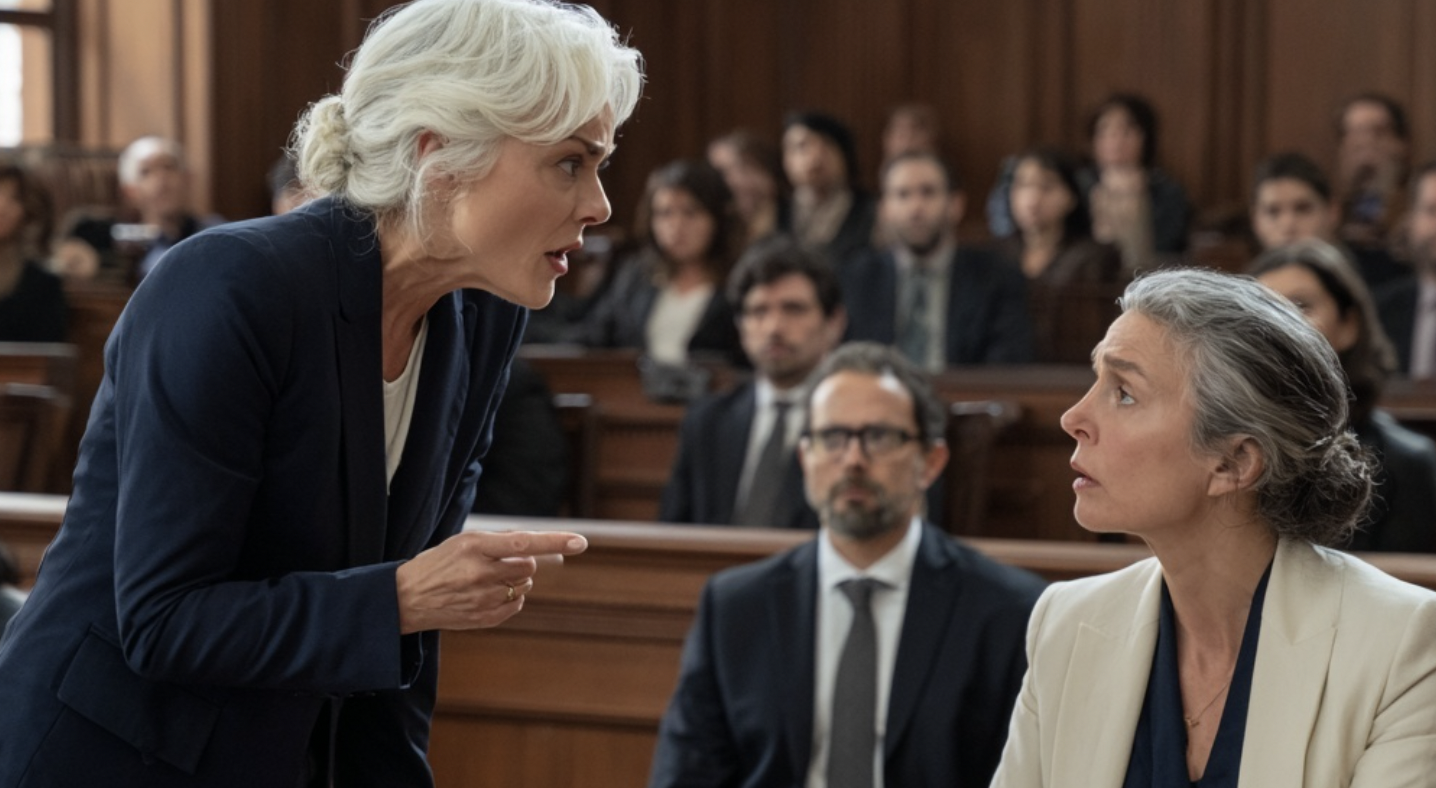Lena had long realized that marriage had turned into hard labor. Five years ago, Andrey had seemed like a caring man who wanted to build a strong family. But after the wedding it was as if he’d been swapped for someone else. He quit his job three months in, blaming back problems, though doctors found no serious diagnosis.
“Len, why should I run around for pennies?” Andrey declared when his wife once again suggested he look for openings. “You make decent money at the mall. I’ll keep the place in order at home.”
Of course, he didn’t keep anything in order. Andrey lay on the couch all day, scrolling social media or playing computer games. Lena got up at six, worked as a sales consultant in an electronics store, and in the evening cooked dinner, did the laundry, and cleaned the apartment. Andrey took this arrangement for granted.
Her mother-in-law, Valentina Mikhailovna, only poured oil on the fire. She visited regularly and always found a reason to criticize.
“Andryusha, have you lost weight?” she lamented, eyeing her son. “Lena, you don’t feed him at all! Look how thin he’s gotten!”
“Valentina Mikhailovna, Andrey eats more than I do,” Lena explained patiently. “He just stopped exercising after he left his job.”
“Don’t argue with your elders!” the mother-in-law cut her off sharply. “My son has always been an active boy, and now he sits at home. That means he can’t find an outlet for his talents.”
Lena flushed with indignation but kept quiet. Arguing with Valentina Mikhailovna meant triggering a scandal that would drag on for a week.
The last straw came on an October evening when Lena came home from work especially exhausted. The store had inventory that day; it had been tense. At home there was the usual mess: dirty dishes in the sink, crumbs on the table, clothes strewn about.
“Andrey, you promised to at least wash the plates,” Lena said wearily.
“Oh, I forgot,” her husband replied indifferently, not taking his eyes off the computer screen. “I’ll do it tomorrow.”
“Tomorrow I’ll be working late again! Is it really impossible to spend half an hour on basic help?”
Andrey swiveled in his chair and gave his wife a contemptuous look.
“Listen, stop riding me! What am I, some kind of slave? If I want to wash them, I will; if I don’t, I won’t. It’s my apartment too!”
“Yours?” Lena frowned and tilted her head. “Do you remember that I bought the apartment before our marriage? With my own money?”
“So what? After the wedding everything became joint property!”
“No, Andrey. Property acquired before marriage remains personal. And in five years you haven’t put a single ruble into the family budget.”
Her husband jumped up, his face contorted with rage.
“How dare you!” he shouted. “I’m your husband, not some freeloader! And anyway, my mother’s right—you’ve gotten too big for your britches!”
Lena stood in the middle of the room, looking at the man she had once married with such hope. Now there was a stranger in front of her—aggressive, yelling, waving his arms.
“You know what, Andrey?” Lena said calmly. “Tomorrow I’m filing for divorce.”
“What?!” Andrey froze, mouth open. “Are you out of your mind?”
“On the contrary—I’ve finally come to my senses.”
The next day Lena took time off and went to a lawyer. The consultation lasted almost an hour. She learned that the divorce would go through the courts, since Andrey was unlikely to agree to dissolve the marriage voluntarily. The lawyer explained what documents she needed to protect her property.
“Do you have the purchase agreement for the apartment?” the attorney asked.
“Yes, of course. I bought it two years before I even met my husband.”
“Excellent. And whose name is the car in?”
“Formally, my father’s. He bought the car on credit, but I made the monthly payments. It was easier that way—the bank approved the application more readily because of his higher salary.”
“Good, but it would be best to transfer the car to your name before the divorce. Or get a written statement from your father that the car effectively belongs to you.”
Lena nodded. In five years of marriage they hadn’t acquired any joint property—on a sales clerk’s salary you could survive, not buy anything substantial.
At home, her husband greeted her warily. All day Andrey had clearly been nervous, realizing he’d gone too far during the previous night’s blow-up.
“Len, you’re not serious about the divorce, are you?” he asked cautiously. “We were both just tired and said things we didn’t mean.”
“I filed a petition with the court this morning,” Lena replied evenly.
Andrey went pale, then his face flushed with fury.
“How dare you do it without me! I’m your husband!”
“And that’s exactly why I’m divorcing you. I’m done putting up with your rudeness and laziness.”
“Who do you think you are?!” Andrey flared. “So you’re a salesgirl—big deal! How much do you even make with your little courses and certificates?”
“Enough to support a family of two. But three is getting tough.”
“I’ll call my mother right now!” he threatened. “We’ll see what she has to say!”
“Call her. I don’t care.”
Valentina Mikhailovna rushed over half an hour later. She burst into the apartment without knocking, as if it were her family’s property.
“Lena!” the mother-in-law thundered. “What foolishness have you come up with?”
“No foolishness. I just can’t live any longer with someone who doesn’t want to work or help around the house.”
“Andrey is ill! The boy has spinal problems!”
“Valentina Mikhailovna, the doctors found no serious illnesses. Yet somehow he’s healthy enough for twelve hours of video games a day.”
The mother-in-law snorted and turned to her son.
“Andryusha, don’t worry. We’ll take everything through the courts. The apartment, the car—we’ll split everything in half. Maybe more, if we get a good lawyer.”
Lena clapped her hands in disbelief.
“Do you even hear yourself, Valentina Mikhailovna? What is there to split? The apartment was bought before the marriage; the car is registered to my father.”
“We’ll see!” the mother-in-law sneered. “In marriage everything becomes joint. My son isn’t stupid; he knows his rights.”
“Then see you in court,” Lena replied coolly.
The next two weeks passed in a tense atmosphere. Andrey alternated between trying to make peace—promising to find a job and change—and flying into rages, threatening to claim half the apartment. Lena gathered documents and prepared for the proceedings.
Her father supported her unconditionally.
“Lena, you’re doing the right thing,” said Ivan Nikolaevich. “I never understood what you saw in that layabout from the start. We’ll transfer the car to you right away so there are no questions.”
“Thanks, Dad. They’re already divvying up your property over there.”
“Let them try. The loan agreement is in my name; all payments came from my card. The money you sent me was help to your father, nothing more.”
A month later, the court summons arrived. Lena was nervous but ready to stand her ground. She understood that an unpleasant process lay ahead, but there was no alternative. For five years she’d been carrying an adult man who refused to work or help at home. Enough.
The day of the hearing was overcast and rainy. Lena put on a tailored suit, took her folder of documents, and went to court. Andrey and Valentina Mikhailovna were already seated in the courtroom. The mother-in-law was dressed as if for a celebration and looked quite pleased with herself.
Judge Irina Petrovna—a middle-aged woman with an attentive gaze—entered and took her seat. The clerk announced the start of the session.
“Hearing the case for dissolution of marriage between Elena Vladimirovna Sokolova and Andrey Valentinovich Morozov,” the judge read. “Plaintiff—Sokolova, Elena Vladimirovna.”
Irina Petrovna began reading the case materials, clarifying dates of marriage registration and acquisition of the disputed property. Lena listened carefully, checking that all information was correct.
“The apartment at the address… was acquired by the plaintiff in two thousand eighteen,” the judge stated. “The marriage was registered in two thousand nineteen. The automobile is registered to Sokolov, Ivan Nikolaevich, in two thousand twenty-one.”
Valentina Mikhailovna couldn’t stand it. She shot to her feet and shouted:
“My son will take everything from you—you’ll be left without a kopek!”
Lena froze, blinking. She couldn’t believe an adult would stage such a scene in a courtroom. Then she frowned and shook her head—her mother-in-law’s behavior was simply indecent.
“Citizen Morozova!” Irina Petrovna snapped. “Maintain order in the courtroom. You are not a party to this case and have no right to interfere in the proceedings.”
“But I’m his mother!” the woman insisted. “I have the right to defend my son!”
“Sit down and be silent,” the judge ordered sternly. “Or I’ll have you removed.”
The mother-in-law grudgingly sat, but continued to bore holes in Lena with a hateful stare.
“We continue,” said Irina Petrovna. “Do the parties have claims regarding the division of property?”
Lena rose and answered calmly:
“Your Honor, I have no claims. The apartment was acquired before the marriage with my personal funds—here is the purchase agreement and a bank statement showing the mortgage was paid off. The automobile is registered to my father; the loan agreement and payment records are attached.”
She handed the folder to the clerk. All documents were in perfect order; the dates raised no doubts.
“Does the respondent have objections?” the judge asked Andrey.
He exchanged a confused glance with his mother, then said uncertainly:
“I believe I have a right to part of the apartment. We were married for five years.”
“On what grounds?” Irina Petrovna asked. “The residence was acquired before the marriage was registered.”
“But I lived there! I did repairs!”
“What repairs?” Lena asked in surprise. “Andrey, you didn’t drive a single nail in five years.”
“Oh yes I did!” he protested. “I hung shelves and fixed faucets!”
Lena nearly laughed. He had hung one shelf in the hallway, which fell down with the books a week later. After that, he never touched a household task again.
“There is no documentary proof of any repair work by the respondent,” the judge stated. “Moving on.”
She studied the documents carefully. The purchase agreement for the apartment was signed in October 2018; the marriage certificate was dated May 2019. A seven-month gap—legally more than enough to classify the residence as premarital property.
“The automobile was purchased on credit by Sokolov, Ivan Nikolaevich, in two thousand twenty-one,” the judge continued, turning the pages. “All payments were made from the owner’s bank card. Does the respondent have evidence of participation in acquiring the vehicle?”
Andrey faltered and glanced helplessly at his mother. She nodded meaningfully, but he clearly had no idea what to say.
“I…” he began. “I mean… we were a family. Shared money, shared purchases.”
“Do you have specific evidence?” the judge pressed. “Transfer records, receipts, IOUs?”
“No,” Andrey said quietly.
The judge nodded and continued reviewing the file. Inside were Lena’s income statements for the past five years, bank account statements, and documents confirming that her husband had had no official employment since quitting.
“It is established that the respondent has had no permanent employment since August two thousand nineteen,” the judge said. “The family budget was formed exclusively from the plaintiff’s income.”
Again, the mother-in-law couldn’t hold back.
“What about moral damages?” she blurted out. “My son wasted five years of his life on this ungrateful woman!”
“Citizen Morozova, final warning!” the judge snapped.
Lena watched with a kind of detached calm. The behavior of her ex-family no longer upset her—it simply baffled her. How could they so openly display such greed and brazenness?
“Thus,” Irina Petrovna concluded, “the plaintiff has provided exhaustive evidence that the disputed property is not jointly acquired during the marriage. The apartment was purchased before the marriage with the plaintiff’s personal funds. The automobile belongs to the plaintiff’s father, which is confirmed by documents.”
Andrey turned pale. Until that moment he had clearly counted on getting half the apartment. He looked at his mother, who could only glare spitefully at Lena.
“The respondent has no legal grounds to assert property claims,” the judge continued. “The fact of cohabitation and maintaining a household together is not grounds for acquiring rights to a spouse’s premarital property.”
“But something should be left to me!” Andrey burst out. “I’m not some beggar!”
“No jointly acquired property was created in this marriage,” Irina Petrovna replied evenly. “All major purchases were made before the marriage or were registered to third parties.”
Lena silently thanked her father for his foresight. When Ivan Nikolaevich had suggested putting the car in his name, she hadn’t thought much of it. Now it was clear how prudent he’d been.
“Proceeding to the final part of the hearing,” the judge announced. “The parties may make closing statements.”
Lena stood.
“Your Honor, I ask that the marriage be dissolved. I have no claims regarding division of property, since there is no jointly acquired property. There are no alimony obligations between the spouses, as there are no minor children in common.”
“Does the respondent wish to add anything?”
Andrey shifted, clearly at a loss. At last he muttered:
“I don’t agree to the divorce. We can fix everything, reconcile.”
“The decision to dissolve a marriage is made by the court regardless of one party’s consent,” Irina Petrovna explained. “The one-month reconciliation period ends tomorrow.”
The judge withdrew to the deliberation room. Lena sat calmly, leafing through her documents. Andrey paced nervously, while Valentina Mikhailovna whispered heatedly in his ear.
Twenty minutes later, the session resumed.
“In the name of the Russian Federation,” Irina Petrovna intoned. “The marriage between Sokolova, Elena Vladimirovna, and Morozov, Andrey Valentinovich, is dissolved. The request for division of property is denied due to the absence of jointly acquired property. The court’s decision enters into legal force in one month.”
Valentina Mikhailovna shot to her feet as if stung.
“Disgraceful!” she shouted. “The judges are corrupt! My son spent five years of his life, and now they’re throwing him out on the street!”
“Citizen Morozova, keep order!” the bailiff said sternly.
“I won’t keep quiet!” she raged on. “That witch took everything from us!”
“Remove the disruptive party from the courtroom,” the judge ordered.
Two bailiffs approached Valentina Mikhailovna and firmly led her out. She shouted and tried to pull away, but the officers were unyielding.
“Andrey!” the mother-in-law yelled as she was taken out. “File an appeal! Don’t you dare give up!”
Lena watched the scene with curious detachment. She felt neither gloating nor pity—only bewilderment at the behavior of people she had lived with for five years.
Her husband stood in the middle of the room looking lost. He clearly hadn’t expected this outcome and didn’t know what to do.
“Lena,” he began uncertainly. “Maybe we really could try again? I’ll find a job, I’ll change.”
“Too late, Andrey,” Lena replied calmly. “You had five years to change.”
“But where am I supposed to go? I have nothing.”
“That’s no longer my problem.”
Lena gathered her documents, neatly put them in the folder, and headed for the exit. Behind her she could hear her ex-husband’s bewildered laments, but she didn’t turn around.
A fine drizzle was falling outside. Lena took out her umbrella and walked slowly to the bus stop. Inside, a strange feeling was rising—not joy, not relief, more like a kind of emptiness. Five years of her life had ended, and now she had to start from scratch.
At home, Lena brewed coffee and sat at the table with the court decision. She needed to read the document carefully and understand all the nuances and consequences. She opened her home safe and took out a folder of important papers. The court decision went there as well—a symbol of a completed chapter of life.
An hour later the phone rang. It was her father.
“Lena, how are you? How did the hearing go?”
“Everything’s fine, Dad. The divorce is granted, and the property stays with me. Thank you for the advice about the car.”
“I told you those types only count on freebies. So, will you finally live in peace now?”
“I hope so.”
“And where will Andrey live?”
“I don’t know and don’t want to know. He can move in with his mother or rent a place. He’ll have to work anyway.”
Ivan Nikolaevich snorted.
“If only he’d done his military service twenty years ago, maybe he would’ve turned into someone. Now it’s too late.”
After the call, Lena felt tired. She took a hot shower, changed into home clothes, and sat down in front of the TV. For the first time in many years, she didn’t have to clean up after anyone, cook for anyone, or argue with anyone about dirty dishes.
The apartment seemed too quiet and spacious. Three people had lived here for five years; now only Lena remained. But she didn’t feel lonely—she felt she had finally found peace.
The next day Andrey came to collect his things. He looked rumpled and upset, as if he’d only now grasped the scale of what had happened.
“Lena, I’ll be living with my mom,” the ex-husband said, packing clothes into bags. “Just for now, until I get a job.”
“Good luck.”
“Maybe…” Andrey hesitated. “Maybe after some time we could… you know, stay friends?”
“No,” Lena said firmly. “It’s better if we forget about each other.”
Andrey nodded and silently kept packing. Half an hour later he left, putting the keys on the kitchen table.
Lena took the keys and put them in the dresser drawer. There was now nothing left in the apartment to remind her of the marriage. She walked to the window and looked out at the autumn courtyard. The leaves on the trees had yellowed and were slowly falling, preparing nature for winter. But for Lena this period was not an end, but the beginning of a new life.
In the evening her friend Marina called.
“Len, how are you? I heard you finally got divorced?”
“Yes, the hearing was yesterday. Everything went smoothly.”
“Thank God! I thought you’d be dragging that freeloader around until you were old. Maybe we should celebrate your freedom?”
“Maybe,” Lena smiled. “But not now. I just want to be alone for a bit, to get used to it.”
“I get it. Well, call me if you need anything—we’ll talk.”
After the call, Lena made herself dinner—a light salad and a piece of baked fish. There was only one plate on the table, one fork, one mug. Somehow, that didn’t make her sad—it made her happy. No one would demand seconds, criticize the cooking, or leave dirty dishes in the sink.
Before bed, she opened the safe again and looked at the documents: the apartment deed, the car title, the court decision. All of it belonged to Lena alone now, and no one could lay claim to the fruits of her labor.
Valentina Mikhailovna never calmed down. She called Lena several times, making threats and demanding a “fair division,” but the former daughter-in-law simply declined the calls. In the end, Lena blocked her number—she had no desire to speak to that woman again.
A month after the divorce, Andrey found a job—he became a courier for a food delivery service. The pay was modest, but enough to rent a room in a communal apartment. His mother constantly nagged him for failing to “snag” at least part of his ex-wife’s home.
Lena heard these details from mutual acquaintances, but she had little interest in her ex-husband’s fate. She was busy with her own life: she finally had time for hobbies, reading, and meeting friends. The salary that used to be spent on three people now allowed her to live comfortably.
Six months after the divorce, Lena met a colleague from the neighboring store. Viktor turned out to be a divorced man with a child—hard-working and responsible. Their relationship developed slowly, with no pressure and no rush to move in together.
The apartment still belonged to Lena alone, the car had been transferred from her father to her, and the safe held documents confirming her independence. Five years of marriage to a parasite had taught Lena to value freedom and never again let anyone live at her expense.
Life was finally back under control.



